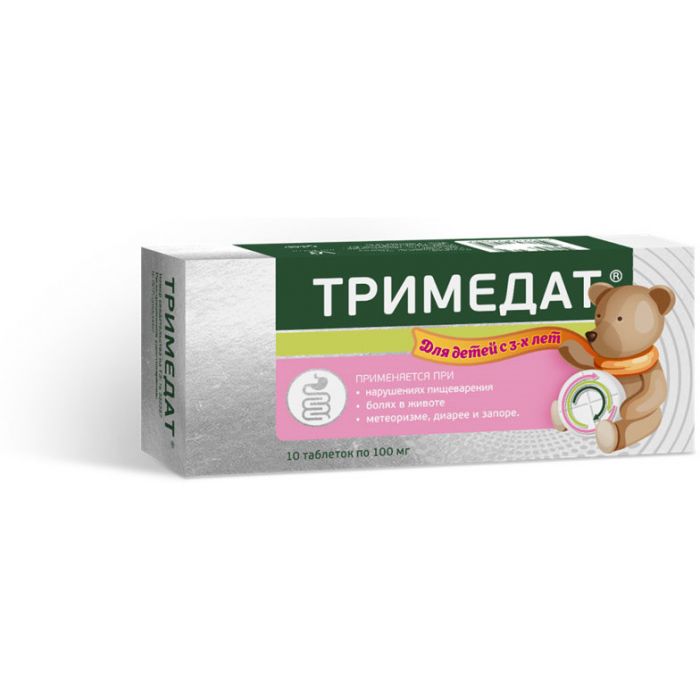Trimedat tab. 100mg # 10
Category
Preparations for the gastrointestinal tract
Scope of the drug
Gastrointestinal tract
Release form
Tablet
Manufacturer country
Russia
Package quantity, pcs
ten
Dosage form
White round flat-cylindrical tablets with a bevel and two intersecting marks on one side
Structure
One tablet contains:
active substance: trimebutin maleate - 100 mg
excipients: lactose monohydrate - 70 mg, potato starch - 20 mg, povidone - 4 mg, colloidal silicon dioxide (Aerosil) - 2 mg, magnesium stearate - 2 mg, talc - 2 mg.
pharmachologic effect
Trimebutin, acting on the enkephalinergic system of the intestine, is a regulator of its peristalsis.
Acting on peripheral 5-, p- and k receptors, including those located directly on smooth muscles throughout the gastrointestinal tract (GIT), it regulates motility without affecting the central nervous system.
Thus, trimebutin restores the normal physiological activity of the intestinal musculature in various gastrointestinal diseases associated with motility disorders.
By normalizing visceral sensitivity, trimebutin provides an analgesic effect in abdominal pain syndrome.
Pharmacokinetics
After oral administration, trimebutin is rapidly absorbed from the gastrointestinal tract.
The maximum concentration (Cmax) in blood plasma is reached after 1-2 hours. Bioavailability is 4-6%.
The volume of distribution (Vd) - 88 liters.
The degree of binding to plasma proteins is low - about 5%.
Trimebutine slightly crosses the placental barrier.
Trimebutine is biotransformed in the liver and excreted in the urine mainly as metabolites (approximately 70% during the first 24 hours).
The half-life (T1 / 2) is about 12 hours.
Side effects
From the digestive system: dry mouth, unpleasant taste, diarrhea, dyspepsia, nausea, constipation.
From the nervous system: drowsiness, fatigue, dizziness, headache, anxiety.
Allergic reactions: skin rash.
Others: menstrual irregularities, painful enlargement of the mammary glands, urinary retention.
Selling features
Available without a prescription
Special conditions
The course of treatment of irritable bowel syndrome in the acute period of 600 mg per day for 4 weeks and the continuation of treatment after the course at a dose of 300 mg per day for 12 weeks allows you to avoid recurrence of the disease.
Influence on the ability to drive vehicles and mechanisms:
The drug does not have a sedative effect, does not affect the speed of the psychomotor reaction and can be used in people of various professions, including those requiring increased attention and coordination of movements.
However, given the possible side effects that can affect these abilities (dizziness and others), care should be taken when driving vehicles and engaging in other potentially hazardous activities.
Indications
Irritable Bowel Syndrome.
Postoperative paralytic intestinal obstruction.
Contraindications
Hypersensitivity to trimebutin maleate and other components that make up the drug.
Lactase deficiency, lactose intolerance, glucose-galactose malabsorption.
Children under 3 years old - for this dosage form.
Pregnancy.
Pregnancy and lactation:
Experimental studies have not revealed data on the teratogenicity and embryotoxicity of the drug.
However, due to the lack of the necessary clinical data, the use of Trimedat® Valenta during pregnancy is contraindicated.
It is not recommended to prescribe Trimedat® Valenta during lactation, due to the lack of reliable clinical data confirming the safety of the drug during this period.
If necessary, use of the drug during lactation should stop breastfeeding.
Drug interactions
Drug inter
Name ENG
TRIMEDAT
Clinical and pharmacological group
A drug that regulates the motor function of the gastrointestinal tract
ATX code
Trimebutine
Dosage
100mg
Structure
active substance: trimebutin maleate - 100 mg.
excipients: lactose monohydrate - 70 mg, potato starch - 20 mg, povidone - 4 mg, colloidal silicon dioxide (aerosil) - 2 mg, magnesium stearate - 2 mg, talc - 2 mg.
Indications
Gastrointestinal motility disorders in the following diseases and conditions:
gastroesophageal reflux disease
dyspeptic disorders in gastroduodenal diseases (abdominal pain, indigestion, nausea, vomiting)
irritable bowel syndrome (manifested by pain, abdominal cramps, intestinal cramps, flatulence, diarrhea, and / or constipation)
postoperative paralytic intestinal obstruction
preparation for X-ray / endoscopic examination of the gastrointestinal tract
dyspeptic disorders in children associated with impaired gastrointestinal motility.
Contraindications
hypersensitivity to drug components
children under 3 years old
pregnancy and lactation.
Storage conditions and periods
At a temperature not exceeding 25 degrees, in the original packaging.
Expiration date: 3 years
INN / Active ingredient
trimebutine maleate
Specifications
Category
Preparations for the gastrointestinal tract
Scope of the drug
Gastrointestinal tract
Release form
Tablet
Manufacturer country
Russia
Package quantity, pcs
ten
Scope of application
Gastroenterology
Minimum age from
3 years old
Way of introduction
Through the mouth
Vacation conditions
Without recipe
Brand name
Valenta Pharmaceuticals
The amount of the dosage form in the primary package
10 pieces.
Primary packaging type
Blister
Type of consumer packaging
Pack of cardboard
Pharmaco-therapeutic group
Antispasmodic
Anatomical and therapeutic characteristics
A03AA05 Trimebutin
Dosage form
Pills
The target audience
Children
Expiration date in days
1095
Dosage (volume) of the substance in the preparation
trimebutine maleate 100 mg
Package weight, g
45
Mode of application
:
Inside.
Adults and children from 12 years old: 100-200 mg 3 times a day.
To prevent recurrence of irritable bowel syndrome after the course of treatment during the period of remission, it is recommended to continue taking the drug at a dose of 300 mg per day for 12 weeks. < br> Children 3-5 years old: 25 mg 3 times a day.
Children 5-12 years old: 50 mg 3 times a day.
Information on technical characteristics, delivery set, country of manufacture

